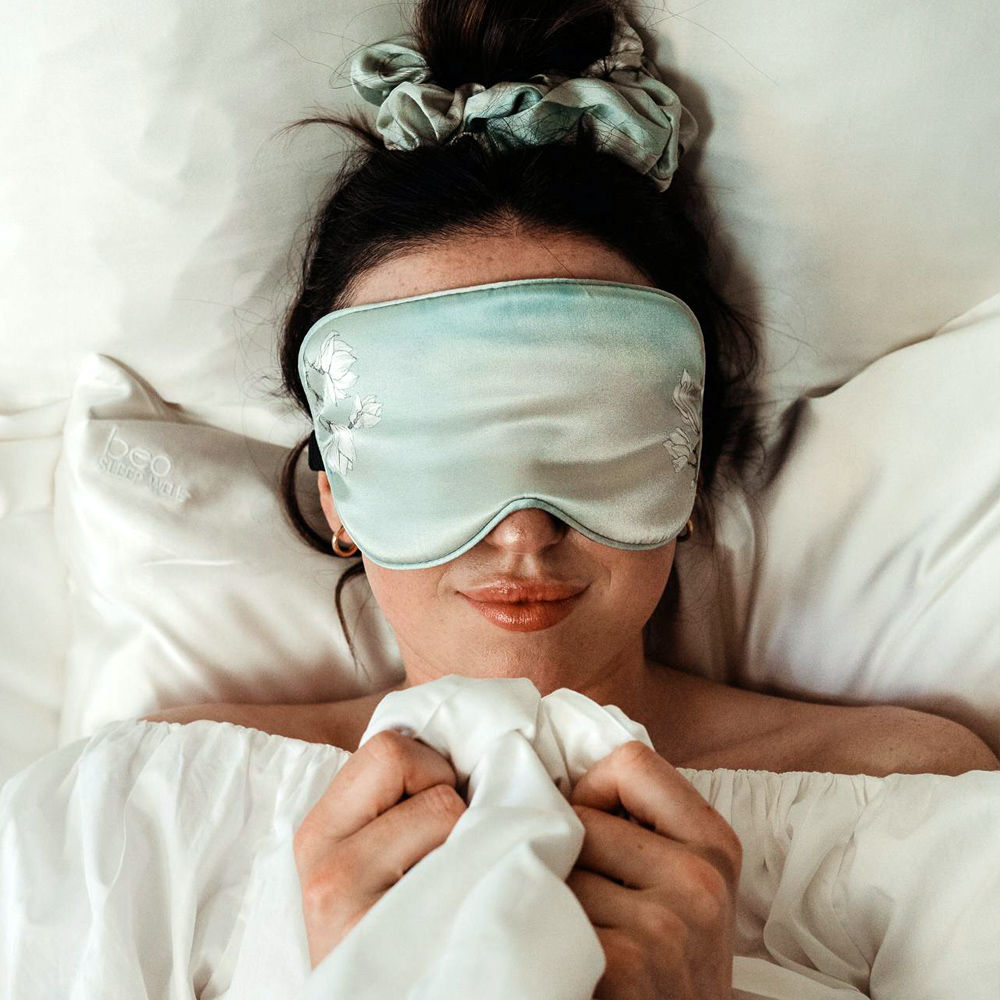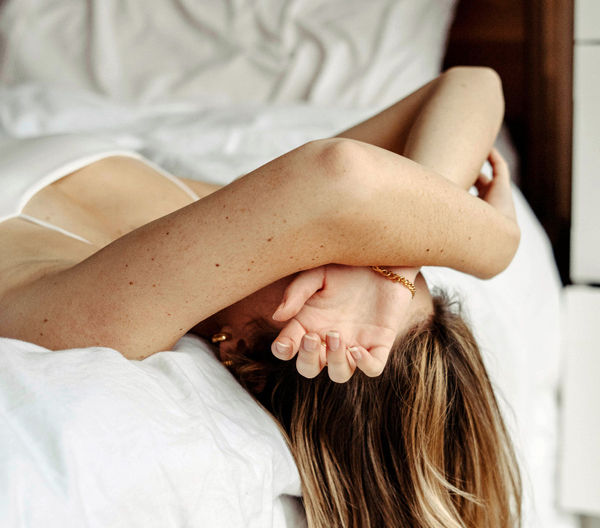Your Shopping Bag is Empty

SOUND ASLEEP
Forget counting sheep, BEO Resident Sleep Expert & Health Scientist, Tom Coleman, reveals how to actually fall and stay asleep.
Getting a good night’s sleep is easier said than done. Even if you’re one of the lucky ones who tends to nod off as soon as your head hits the pillow, it’s unlikely that you experience a deep, eight hours of REM cycle. Between waking up in the middle of the night to waking up too early to not falling asleep at all, a decent night’s sleep has become a rare and coveted occurrence.
And with winter fast approaching, the bad news is that your sleeping pattern is only set to get worse. “The sleep hormone melatonin is only produced when it’s dark and so in winter as we experience darker mornings and evenings, we experience a natural tendency to sleep for longer,” explains Tom Coleman, BEO Resident Sleep Expert & Health Scientist. Which, when paired with the inability to sleep, results in even more bedtime difficulties.

Rather than restlessly lying awake all night, there are a few things you can do to sleep better once and for all. But before we can get to the ‘how to’, we first must learn the sleeping basics, starting with just how much sleep we should be getting. “The recommendation varies through our life span but for most adults, the advisement is 7.5 hours per night,” says Coleman. That said, we’re all different. “Some people operate quite well on six hours where others require nine, so there is variance,” he adds. “We sleep in 90-minute cycles and so should be getting five cycles per night.”
It’s not just how long you’re asleep that impacts your wellness. “Sleep regularity has been shown in studies to be just as important as the amount of sleep you get,” Coleman says. “This is why sticking to a schedule and routine will embed our sleep onset time.”

Founded by Aoibhín Garrihy and Sharon Connellan, BEO Sleep Well has just launched an exclusive pop-up in our store. You can now shop their organic products as well as two new collections in-store or online.

When it comes to self-care, we're devoted to our skincare regimens, our fitness routines, and our dietary preferences, but in the midst of our busy schedules, we often spend far less time ensuring that we get enough sleep. “I describe sleep as the ultimate act of self-care,” says Coleman. “There isn’t one single aspect of health that isn’t impacted by a lack of sleep. Our hormonal health, our metabolism, our immune health, our brain health as well as our psychological wellbeing, is all dependent upon sleep.” One heavily cited study reveals that we should be spending 36% of our lives asleep, and as Coleman tells us, “that’s more time dedicated to one activity in human biology than any other.” Further to that point, “this alone should teach us how important sleep really is,” he adds.
But even with a firm sleep schedule in place, a recommended 7.5 hours under your belt and the understanding of the true importance of a good night’s sleep, actually falling - and staying asleep - can still prove to be challenging. Luckily, there’s something you can do about that too...
If you spend most nights frustratingly staring at the clock as the hours pass, it’s likely a result of how you’ve spent your day. Here, Coleman breaks down the five crucial steps to falling asleep, fast.
Step One: Create a ritual or routine
The brain loves habits, so going to bed and rising at the same time will train the subconscious. Building a ritual around sleep will also reinforce that. That could be disconnecting from technology an hour before, having a shower, a cup of herbal tea, light stretching, making your bedroom environment a haven for sleep, doing a breathing exercise and / or using an eye mask.
Step Two: Watch what you drink
We must understand that everything we do during the day informs the quality and quantity of our sleep. Caffeine and alcohol both interfere with sleep onset and sleep quality. Avoid caffeine after lunch and don’t overconsume alcohol.
Step Three: Set the mood
Ensure you have a clutter-free bedroom that is cool, dark and well ventilated. Remember to get lots of light exposure when you are active during daylight hours as well as regular exercise. Use an eye mask and ear plugs, and a relaxing scent will calm the senses and the nervous system.
Step Four: Unwind the mind
Many people neglect to unwind cognitively and emotionally and expect to be able to just “switch off” when they jump into bed. We are good at unwinding our children, but we must remember that an overstimulated mind will gravitate toward worry at night. Reading, meditation, breathing or other simple cognitive tasks will help.
Step Five: And Breathe We know bringing awareness to our breath brings us into the ‘now’ rather than the busy day we have lined up for tomorrow. Any breathing exercise where we extend our exhalation is the fastest scientific method to reduce stress. A body scan or breathing exercise elicits the ‘rest and recover’ response and encourages relaxation and sleep.
Waking up in the middle of the night can be incredibly frustrating, especially if it happens a lot. While it isn’t uncommon to wake up at two or three in the morning every once in a while, when it happens almost every night - it can become more troublesome to deal with. That being said, there are things you can do to make the experience of waking up in the middle of the night a little easier – and help yourself to switch off and fall asleep again when the time is right. “Stop putting pressure on yourself and realise this is very common and in most cases normal,” says Coleman. “Many people wake up toward the end of their REM cycle which is a light phase of sleep. Don’t check the time and get stressed. Instead, throw the bedsheets off to cool down and initiate your sleep routine.”
Anxiety at night is a vicious circle: it can keep you from sleeping, while lack of sleep can increase your anxiety. “A state of not knowing the outcome has crept into our lives and this has increased anticipatory anxiety which disrupts sleep,” explains Coleman. “Overthinking, worry, technology and stress have shaped our psyche and interfered with our emotional and mental wellbeing.” But luckily, there are ways to manage your anxiety so you can rest. “The first step is recognition and then applying the right solution,” says Coleman. “Making positive lifestyle choices during the day will help hugely, running or walking lowers activity in the threat detection centre of our brains and therefore lowers anxiety. Learning a new skill like meditation, unwinding and taking control of our habits. Remember you can never ‘think’ your way out of a problem at 2am, you have to ‘action’ your way out.”
Getting a full eight hours of sleep a night is often a struggle. To make matters worse, there are times when you continue to feel tired despite feeling like you’ve gotten sufficient sleep. Truth is, there are many reasons to explain why tiredness persists even after getting the recommended number of hours. One of the simplest explanations is that it could be due to your body requiring more rest than the average person. “If we wake up tired and hit the snooze button again and again, then the message is clear, we need to get to bed earlier!” says Coleman. “Try move your bedtime forward by 30 minutes and see how you feel. Once the alarm does go off, then get up, get outside and embrace the day. If you still feel tired, it may be indicative of a different issue.”

"S ometimes the last thing we need is another target. I encourage people to get active, get outside, engage and make better choices. If you get this right, the sleep will look after itself. Tom Coleman, BEO Resident Sleep Expert & Health Scientist.
For more lessons in sleep, follow sleep coach, Tom Coleman on Instagram (@tomcoleman.ie)
BEDTIME BASICS:
Now that you know what it takes to fall asleep, all that’s left to do is create a cosy and comfortable environment.


